外研版(2019) 选择性必修 第三册 Unit 1 Face values Reading课件(共59张PPT)
文档属性
| 名称 | 外研版(2019) 选择性必修 第三册 Unit 1 Face values Reading课件(共59张PPT) |  | |
| 格式 | zip | ||
| 文件大小 | 3.9MB | ||
| 资源类型 | 教案 | ||
| 版本资源 | 外研版(2019) | ||
| 科目 | 英语 | ||
| 更新时间 | 2023-03-12 16:17:35 | ||
图片预览



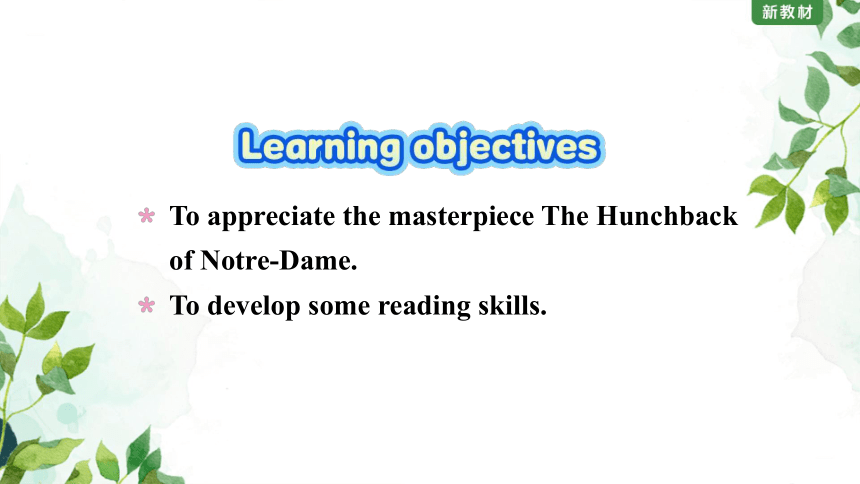
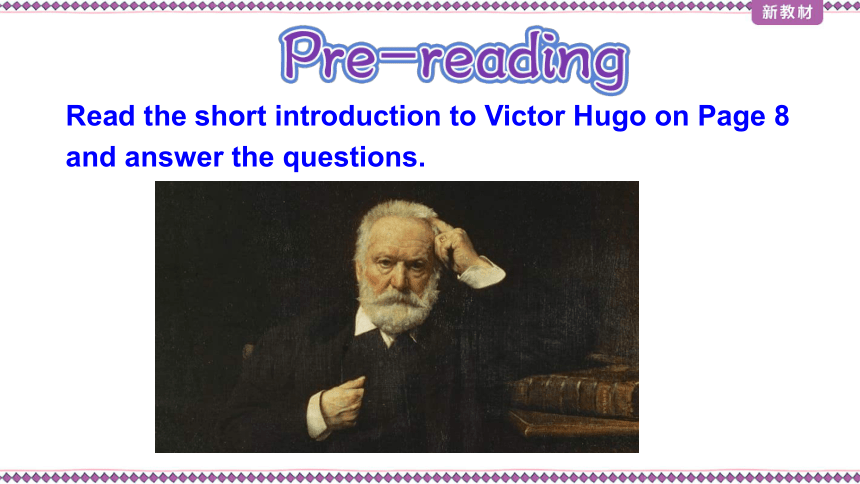
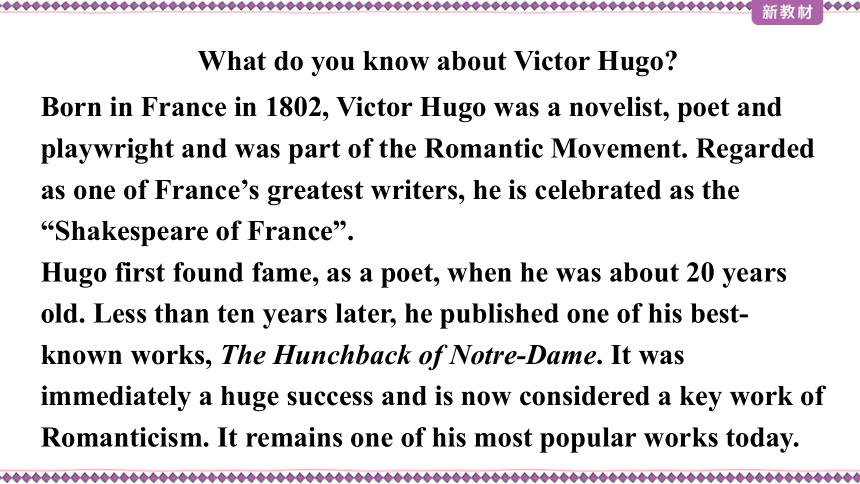
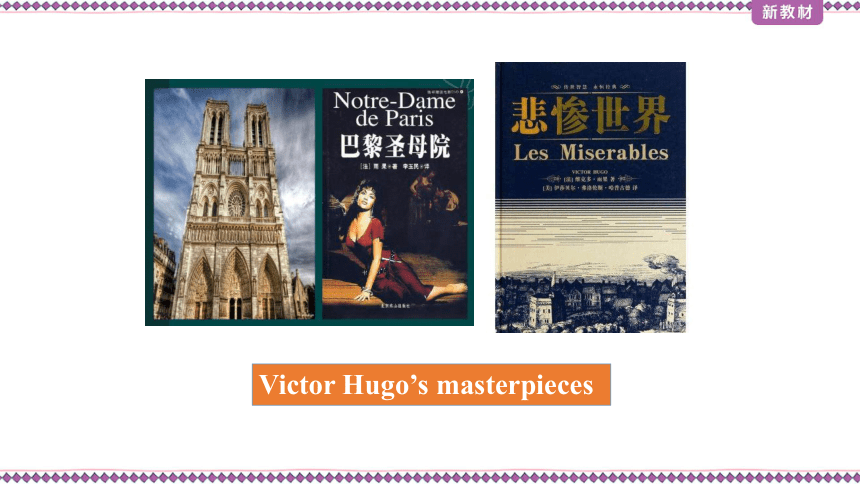
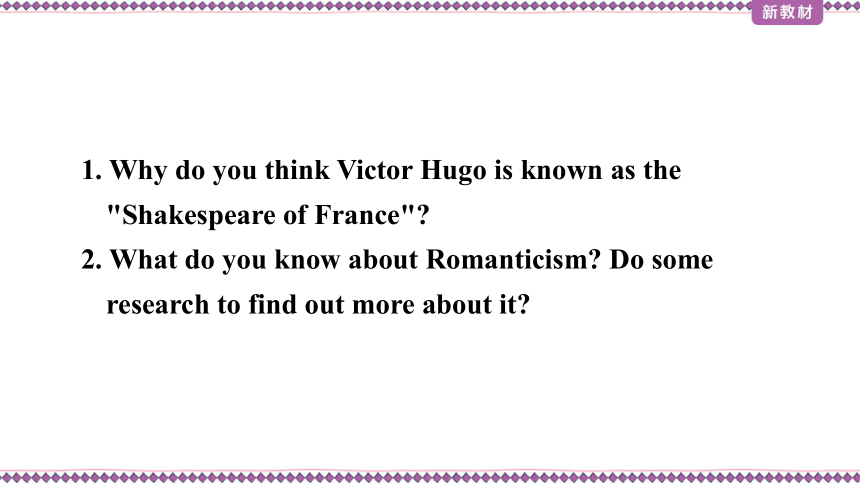
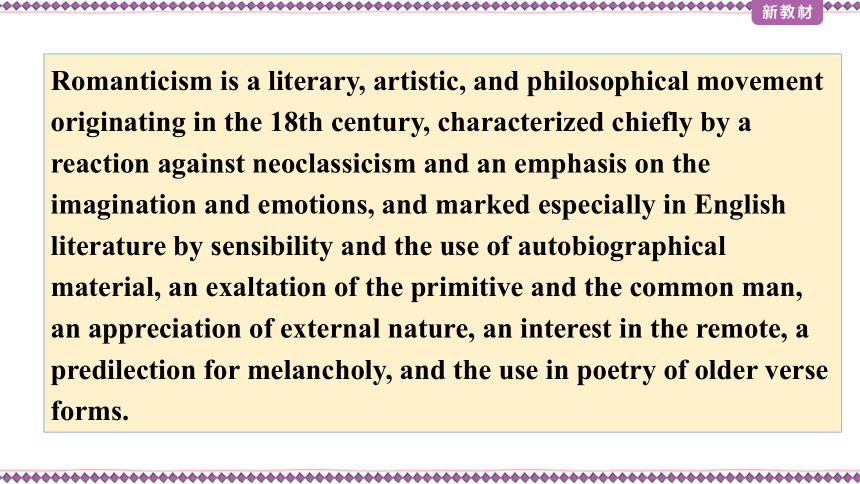

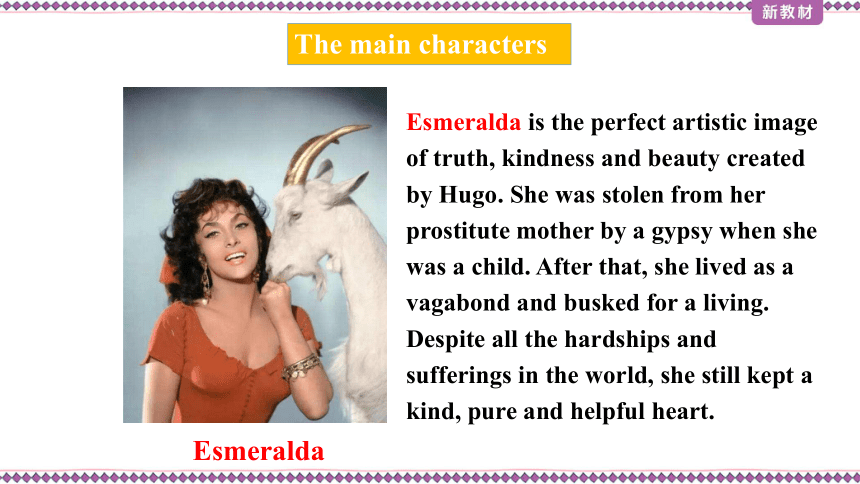

文档简介
(共59张PPT)
Unit 1
Unit 1
Face Values
To appreciate the masterpiece The Hunchback of Notre-Dame.
To develop some reading skills.
Read the short introduction to Victor Hugo on Page 8 and answer the questions.
What do you know about Victor Hugo
Born in France in 1802, Victor Hugo was a novelist, poet and playwright and was part of the Romantic Movement. Regarded as one of France’s greatest writers, he is celebrated as the “Shakespeare of France”.
Hugo first found fame, as a poet, when he was about 20 years old. Less than ten years later, he published one of his best-known works, The Hunchback of Notre-Dame. It was immediately a huge success and is now considered a key work of Romanticism. It remains one of his most popular works today.
Victor Hugo’s masterpieces
1. Why do you think Victor Hugo is known as the "Shakespeare of France"
2. What do you know about Romanticism Do some research to find out more about it
Romanticism is a literary, artistic, and philosophical movement originating in the 18th century, characterized chiefly by a reaction against neoclassicism and an emphasis on the imagination and emotions, and marked especially in English literature by sensibility and the use of autobiographical material, an exaltation of the primitive and the common man, an appreciation of external nature, an interest in the remote, a predilection for melancholy, and the use in poetry of older verse forms.
The Hunchback of Notre-Dame
The main characters
Esmeralda is the perfect artistic image of truth, kindness and beauty created by Hugo. She was stolen from her prostitute mother by a gypsy when she was a child. After that, she lived as a vagabond and busked for a living. Despite all the hardships and sufferings in the world, she still kept a kind, pure and helpful heart.
Esmeralda
Quasimodo was a typical example of the poor people of his time. He was abandoned by his parents at the gate of Notre Dame DE Paris. He was a deformed child with a "geometric face, a tetrahedral nose, a mouth shaped like a horseshoe, jagged teeth, one-eyed, a crooked ear, and an ugly and honest voice." His character was highlighted by his exaggerated appearance.
Quasimodo
Archdeacon Claude was a complex man, a man of great knowledge and strange
character, hateful as well as pitiable.
Archdeacon Claude
Read the passage and choose the best answer.
1. What kind of person is Esmeralda
A. A poor stupid woman.
B. An honest and kind girl.
C. A criminal with no morality.
D. A rebellious new woman.
2. What does the sentence “I feel an immense pity for myself” mean to Quasimodo
A. He was really ugly.
B. He wished to refuse Esmeralda’s kindness.
C. He had once done bad thing to Esmeralda.
D. He would apologize sincerely for his conditions.
3. What does this passage want to tell us
A. A love story between a man and a woman.
B. Emotional changes between men and women.
C. The tragedy of love in a dark society.
D. Love trends of men and women.
Read the passage and find out why Quasimodo rescued Esmeralda.
Quasimodo rescued Esmeralda because when Quasimodo was tortured in public, Esmeralda was the only one to show him kindness and mercy.
Read the main plot and try to divide it into three parts.
Part 2
Part 1
Part 3
( para. 1-5)
(para. 6-11)
(para. 12-15)
Quasimodo’s appearance in Esmeralda’s eyes, and she was surprised to know he is deaf.
Quasimodo expressed his inferiority to Esmeralda.
Quasimodo explained the reason why he rescued Esmeralda.
Read the part 1 and answer the questions.
1. What atmosphere were they in
They are in an embarrassing atmosphere (predicament).
2. What first impression did Quasimodo left on Esmeralda
The appearance of Quasimodo was extremely ugly but Esmeralda could feel his sadness (melancholy) and gentleness.
3. How did Esmeralda feel after knowing Quasimodo was deaf
She felt a sense of sympathy.
Quasimodo show his inferiority to Esmeralda. Despite Quasimodo’s ugly appearance, Esmeralda felt his kindness.
1. Why did Quasimodo smile and then laugh
He smiled and laughed to hide his inner sadness, which makes readers more brokenhearted.
2. Why did he feel such a strong sense of inferiority before Esmeralda
In fact, he had an affection for Esmeralda, but he was so ugly with deafness. However, Esmeralda was so beautiful.
Read the part 2 and answer the questions.
3. Why couldn’t Esmeralda say something while Quasimodo was speaking
Firstly, she was aware of Quasimodo profound sadness. Secondly, she didn’t know how to make herself heard because of Quasimodo deafness.
4. Did Quasimodo notice that Esmeralda want to say something when he was so sad
Yes, what he said at the end of the part showed that he was considerate.
Read the part 3 and answer the questions.
2. Why did Quasimodo hold back his tear
Not crying was the only honor he had before Esmeralda, and he may not want to make Esmeralda feel sympathy for him.
1. Why did Quasimodo rescue Esmeralda
He rescued Esmeralda because when he was tortured in public, Esmeralda was the only one to show him kindness and mercy.
Underline the sentences that describe Esmeralda and Quasimodo's appearances and feelings. Write a short paragraph to describe how Esmeralda and Quasimodo see each other.
Esmeralda in Quasimodo's eyes:
Quasimodo thought Esmeralda was graceful and exquisitely beautiful, like a ray of sunshine, a drop of dew or a birdsong.
Quasimodo in Esmeralda's eyes:
Esmeralda thought Quasimodo was repulsive, with knock knees. a hunched back and a single eye; yet beneath his ugliness, he was full of melancholy and gentleness.
Try to conclude the personalities of the main characters.
Quasimodo:
Esmeralda:
self-abasement, considerate, kind, full of gratitude…
kind, considerate, full of sympathy…
Now work in pairs. Read the passage again and find out how Esmeralda's feelings towards Quasimodo changed. Share your answers with your partner.
1. Esmeralda hears his call for water, and steps forwards out of mercy.
埃斯梅拉达听到他对水的呼唤,怜悯之心油然而生。
out of mercy: take pity on 出于怜悯
eg I don’t want anybody to help me out of mercy.
我不想任何人出于怜悯来帮助我。
(1) have a mercy on 对……怜悯
show mercy to 对……怜悯
ask for/ beg for mercy 请求/乞求宽恕
at the mercy of 任凭……摆布
without mercy 毫不留情地,残忍地
It’s mercy that… 幸运的是……
(2) merciful adj. 仁慈的,宽恕的,宽容的
be merciful to 对……仁慈
【归纳拓展】
【语境应用】完成句子。
1) It was quite urgent. The ship and its crew were ________________ (任凭……摆布) the rough sea.
2) The boy was screaming and __________________ (乞求宽恕).
3) _____________________ (幸运的是……) he survived the car crash.
at the mercy of
begging for mercy
It was a mercy that
2. Yet there was so much melancholy and so much gentleness spread over all this that she gradually adjusted to it.
但他表现出那样的忧郁与那样的温顺,她渐渐地适应了。
adjust to: become used to 适应……(to是介词)
eg He can’t adjust easily to the life in North China.
他难以适应中国北方的生活。
I haven’t adjusted to living on my own.
我还没有适应独自生活。
adjust oneself to 使自己适应……
adjust sth to sth 调整……以适应……
eg They will quickly adjust themselves to the school life.
他们将很快适应学校生活。
You can adjust the seat belt to the size you want.
你可以根据自己的需要调整安全带。
【归纳拓展】
【语境应用】单句语法填空。
1) He adjusted to _________ (live) in the remote village.
2) Adjust your language _______ the age of your audience.
living
to
3. He was the first to break the silence.
the + 序数词(+名词)+ 不定式
当被修饰词是序数词或被序数词修饰时,通常用不定式作后置定语。被修饰词与不定式之间是逻辑上的主谓关系。此外,被修饰词被形容词最高级或the only, the very, the last等修饰时也通常用不定式作后置定语。
eg She is always the first to answer questions.
她总是第一个回答问题。
He is the best man to choose. 他是最好的人选。
He would be the last to agree to the plan.
他决不会同意这项计划。
(1) 不定式作定语 通常放在被修饰词的后面,与被修饰词之间可有主谓、动宾或同位关系。
(2) 不定式与被修饰词存在动宾关系时,如果不定式是不及物动词,则后面应有必要的介词。
eg I usually have a lot of meetings to attend.
我通常有很多会议要参加
She is a nice person to work with.
她是个好同事。
(3) 常接不定式作定语的名词有ability, ambition, attempt, chance, decision, effort, moment, need, plan, promise, reason, time, way等。
eg Please make an effort to catch the bus.
请努力赶上公共汽车。
He made a promise to come here on time tomorrow.
他答应明天准时来这里。
【语境应用】单句语法填空。
1) I want to get something ________ (read) during the vacation.
2) We have a lot of things _______ (do), but packing is at the top of the list.
3) They are always the first ________ (bear) hardship and the last _________ (enjoy) comfort.
4) This will be a good opportunity ___________ (exchange) experience.
5) That will be the only thing ________ (do) now.
6) We must have the courage ______ (say) that we are ignorant.
to read
to do
to bear
to enjoy
to exchange
to do
to say
4. “But!” he said, as though hesitating whether to finish, “I am I am deaf.”
“但是!”他说,似乎犹豫着要不要说下去,“我是……我是聋子。”
as though hesitating whether to finish是让步状语从句的省略,补充完整是as though he was hesitating whether to finish。
当时间、条件、让步、方式等状语从句的主语与主句主语一致(或从句主语是it),且从句谓语含有be动词时,可以把从句主语和be动词一起省略。状语从句省略后的结构:连词+现在分词/ 过去分词/ 不定式/ 介词短语/ 名词/ 形容词/ 副词。
eg When (she was) walking along the river bank, she was singing a pop song.她沿着河堤边走边唱着流行歌曲。
Don’t come in until (you are) asked to.没叫你就别进来。
If (you are) in doubt, consult your doctor.
如有疑问,咨询医生。
If (it is) possible, he will help you out of the difficulty.
如果可能的话,他会帮你摆脱困境。
You must attend the meeting unless (it is) inconvenient to you.
除非不方便,否则你必须出席这次会议。
【语境应用】单句语法填空。
1) When _________ (live) in London, I picked up English.
2) If ________ (accept) for the job, you’ll be informed soon.
3) Video games can be a poor influence if _________ (leave) in the wrong hands.
4) She stood at the gate as if ________ (wait) for someone.
5) Unless _________ (invite), I won’t take part in it.
6) Although _______ (do) his best in maths these days, he has still got no good mark.
7) He stood up as if _______ (say) something.
living
accepted
left
waiting
invited
doing
to say
5. Never have I viewed my ugliness as at the present moment.
我从来没像现在这般明白自己的丑陋。
否定词never置于句首,句子使用了部分倒装语序,即把助动词have放在主语I 的前面。
当表示否定意义的词或短语置于句首时,句子用部分倒装语序,即把助动词、情态动词或系动词be移至主语之前。这样的词或短语有never, neither, nor, seldom, little, hardly, rarely, scarcely, at no time, by no means, in no way以及not only… but also…, no sooner… than…, hardly…when…等。
eg Never in all my life have I seen such a horrible thing.
我一辈子没见过这么恐怖的事。
Seldom does he go out for dinner.
他很少出去吃饭。
Little does he realize how important this meeting is.
他没有意识到这个会议的重要性。
【语境应用】完成句子。
1) Hardly _____________ (我注意到) that the holiday is going by.
2) Never ______________ (我看到过) such a beautiful vase before.
3) Seldom __________________ (她丧失信心) when she is in trouble.
4) Rarely ___________ (我看过) such an amazing performance.
5) In no way _______________________ (我对……负责) what has happened.
do I notice
have I seen
does she lose heart
have I seen
am I responsible for
6) Not only _______________________ (他对绘画感兴趣), but he also teaches his son how to draw.
7) I will never know what was on his mind at the time; ________________________ (其他任何人也不知道).
is he interested in painting
nor/ neither will anyone else
6. When I compare myself to you, I feel an immense pity for myself, poor unfortunate monster that I am!
当我把自己同你比较时,我就非常怜悯自己,我是多么可怜而不幸的怪物啊!
compare… to…: ① compare… with… 把……与……相比
② regard as similar or equal to 把……比作……
eg We carefully compared the first report to/ with the second.
我们仔细比较了第一份报告和第二份报告。
Books are often compared to our friends.
书籍常常被比喻为我们的朋友。
【注意】
compare与介词with, to搭配时意义有所不同,但compared with和compared to在句中作状语时意义相同,都表示“与……相比”。
eg He is much more brilliant, compared with/ to what he was before studying at college.
与上大学之前相比,他现在有才华多了。
【归纳拓展】
compare notes (with sb)(和某人)交换看法/ 交换意见
beyond compare 无与伦比
compare and contrast 比较与对比
【语境应用】单句语法填空。
1) People often compare a teacher _______ a gardener who takes great care of various plants.
2) When we compare our films _______ foreign ones, we find many differences.
3) Film has a much shorter history, especially when _________ (compare) to such art forms as music and painting.
4) When __________ (compare) different cultures, we often pay attention only to the differences without noticing their similarities.
to
with/to
compared
comparing
7. You have forgotten an unfortunate person who attempted to kidnap you one night…
你忘了,有天晚上,有个坏家伙想绑架你……
attempt to do sth: 试图做某事
eg The police attempted to link the case to the strange phenomenon.
警察试图把这起案件与这种奇怪的现象联系在一起。
make an attempt to do sth/ at doing sth 试图做某事
in an attempt to do sth 为了做某事
at the first/ second attempt 第一/ 二次尝试
【归纳拓展】
词条 不同点
attempt to do sth 常指一次而不是持续尝试,往往暗示达不到目的。
try do do sth 指为某事付出努力或代价,但不一定成功。
manage to do sth 指设法做成某事,强调结果,相当于 succeed in doing sth。
【语境应用】单句语法填空。
1) He attempted _________ (get) in touch with them but failed.
2) He succeeded in his attempt _______ (break) the world record.
3) She made a few half-hearted attempts ________ join in their conversation.
4) somehow, he managed ___________ (persuade) Kay to buy one for him.
to get
to break
to join
to persuade
1. What does the sentence “A tear swam in the eye of Quasimodo, but did not fall” tell us about Quasimodo's personality
On one hand, it shows that Quasimodo is sensitive and gentle; on the other hand, it shows his strength and pride.
2. In what different ways do the two reading passages in this unit raise our awareness of physical appearance and personal qualities
The first passage shows the true meaning of beauty. Though how you present yourself to others plays a part, accepting yourself and feeling confident about your physical appearance are most important.
The second passage highlights how someone's physical appearance can actually be a complete contrast to who they are on the inside.
3. What difficulties might people like Quasimodo face in the real world How should people treat them
4. Predict what happens next. Share your ideas with the class. Read the novel and check your prediction.
Open.
Open.
Work in groups. Give a talk about the character in the passage that makes the greatest impression on you.
1. Organise your ideas by considering the questions.
What is the character like
Has he/she experienced any emotional changes If so,
what changes are they
What can you learn from him/her
2. Present your ideas in your group.
3. Collect all your group's ideas and present them to the class.
Now think about whether you can express yourself clearly or understand others in the group talk, and what your strengths or weaknesses are, compared to those of the others in your group.
Write a summary based on the main plot.
Unit 1
Unit 1
Face Values
To appreciate the masterpiece The Hunchback of Notre-Dame.
To develop some reading skills.
Read the short introduction to Victor Hugo on Page 8 and answer the questions.
What do you know about Victor Hugo
Born in France in 1802, Victor Hugo was a novelist, poet and playwright and was part of the Romantic Movement. Regarded as one of France’s greatest writers, he is celebrated as the “Shakespeare of France”.
Hugo first found fame, as a poet, when he was about 20 years old. Less than ten years later, he published one of his best-known works, The Hunchback of Notre-Dame. It was immediately a huge success and is now considered a key work of Romanticism. It remains one of his most popular works today.
Victor Hugo’s masterpieces
1. Why do you think Victor Hugo is known as the "Shakespeare of France"
2. What do you know about Romanticism Do some research to find out more about it
Romanticism is a literary, artistic, and philosophical movement originating in the 18th century, characterized chiefly by a reaction against neoclassicism and an emphasis on the imagination and emotions, and marked especially in English literature by sensibility and the use of autobiographical material, an exaltation of the primitive and the common man, an appreciation of external nature, an interest in the remote, a predilection for melancholy, and the use in poetry of older verse forms.
The Hunchback of Notre-Dame
The main characters
Esmeralda is the perfect artistic image of truth, kindness and beauty created by Hugo. She was stolen from her prostitute mother by a gypsy when she was a child. After that, she lived as a vagabond and busked for a living. Despite all the hardships and sufferings in the world, she still kept a kind, pure and helpful heart.
Esmeralda
Quasimodo was a typical example of the poor people of his time. He was abandoned by his parents at the gate of Notre Dame DE Paris. He was a deformed child with a "geometric face, a tetrahedral nose, a mouth shaped like a horseshoe, jagged teeth, one-eyed, a crooked ear, and an ugly and honest voice." His character was highlighted by his exaggerated appearance.
Quasimodo
Archdeacon Claude was a complex man, a man of great knowledge and strange
character, hateful as well as pitiable.
Archdeacon Claude
Read the passage and choose the best answer.
1. What kind of person is Esmeralda
A. A poor stupid woman.
B. An honest and kind girl.
C. A criminal with no morality.
D. A rebellious new woman.
2. What does the sentence “I feel an immense pity for myself” mean to Quasimodo
A. He was really ugly.
B. He wished to refuse Esmeralda’s kindness.
C. He had once done bad thing to Esmeralda.
D. He would apologize sincerely for his conditions.
3. What does this passage want to tell us
A. A love story between a man and a woman.
B. Emotional changes between men and women.
C. The tragedy of love in a dark society.
D. Love trends of men and women.
Read the passage and find out why Quasimodo rescued Esmeralda.
Quasimodo rescued Esmeralda because when Quasimodo was tortured in public, Esmeralda was the only one to show him kindness and mercy.
Read the main plot and try to divide it into three parts.
Part 2
Part 1
Part 3
( para. 1-5)
(para. 6-11)
(para. 12-15)
Quasimodo’s appearance in Esmeralda’s eyes, and she was surprised to know he is deaf.
Quasimodo expressed his inferiority to Esmeralda.
Quasimodo explained the reason why he rescued Esmeralda.
Read the part 1 and answer the questions.
1. What atmosphere were they in
They are in an embarrassing atmosphere (predicament).
2. What first impression did Quasimodo left on Esmeralda
The appearance of Quasimodo was extremely ugly but Esmeralda could feel his sadness (melancholy) and gentleness.
3. How did Esmeralda feel after knowing Quasimodo was deaf
She felt a sense of sympathy.
Quasimodo show his inferiority to Esmeralda. Despite Quasimodo’s ugly appearance, Esmeralda felt his kindness.
1. Why did Quasimodo smile and then laugh
He smiled and laughed to hide his inner sadness, which makes readers more brokenhearted.
2. Why did he feel such a strong sense of inferiority before Esmeralda
In fact, he had an affection for Esmeralda, but he was so ugly with deafness. However, Esmeralda was so beautiful.
Read the part 2 and answer the questions.
3. Why couldn’t Esmeralda say something while Quasimodo was speaking
Firstly, she was aware of Quasimodo profound sadness. Secondly, she didn’t know how to make herself heard because of Quasimodo deafness.
4. Did Quasimodo notice that Esmeralda want to say something when he was so sad
Yes, what he said at the end of the part showed that he was considerate.
Read the part 3 and answer the questions.
2. Why did Quasimodo hold back his tear
Not crying was the only honor he had before Esmeralda, and he may not want to make Esmeralda feel sympathy for him.
1. Why did Quasimodo rescue Esmeralda
He rescued Esmeralda because when he was tortured in public, Esmeralda was the only one to show him kindness and mercy.
Underline the sentences that describe Esmeralda and Quasimodo's appearances and feelings. Write a short paragraph to describe how Esmeralda and Quasimodo see each other.
Esmeralda in Quasimodo's eyes:
Quasimodo thought Esmeralda was graceful and exquisitely beautiful, like a ray of sunshine, a drop of dew or a birdsong.
Quasimodo in Esmeralda's eyes:
Esmeralda thought Quasimodo was repulsive, with knock knees. a hunched back and a single eye; yet beneath his ugliness, he was full of melancholy and gentleness.
Try to conclude the personalities of the main characters.
Quasimodo:
Esmeralda:
self-abasement, considerate, kind, full of gratitude…
kind, considerate, full of sympathy…
Now work in pairs. Read the passage again and find out how Esmeralda's feelings towards Quasimodo changed. Share your answers with your partner.
1. Esmeralda hears his call for water, and steps forwards out of mercy.
埃斯梅拉达听到他对水的呼唤,怜悯之心油然而生。
out of mercy: take pity on 出于怜悯
eg I don’t want anybody to help me out of mercy.
我不想任何人出于怜悯来帮助我。
(1) have a mercy on 对……怜悯
show mercy to 对……怜悯
ask for/ beg for mercy 请求/乞求宽恕
at the mercy of 任凭……摆布
without mercy 毫不留情地,残忍地
It’s mercy that… 幸运的是……
(2) merciful adj. 仁慈的,宽恕的,宽容的
be merciful to 对……仁慈
【归纳拓展】
【语境应用】完成句子。
1) It was quite urgent. The ship and its crew were ________________ (任凭……摆布) the rough sea.
2) The boy was screaming and __________________ (乞求宽恕).
3) _____________________ (幸运的是……) he survived the car crash.
at the mercy of
begging for mercy
It was a mercy that
2. Yet there was so much melancholy and so much gentleness spread over all this that she gradually adjusted to it.
但他表现出那样的忧郁与那样的温顺,她渐渐地适应了。
adjust to: become used to 适应……(to是介词)
eg He can’t adjust easily to the life in North China.
他难以适应中国北方的生活。
I haven’t adjusted to living on my own.
我还没有适应独自生活。
adjust oneself to 使自己适应……
adjust sth to sth 调整……以适应……
eg They will quickly adjust themselves to the school life.
他们将很快适应学校生活。
You can adjust the seat belt to the size you want.
你可以根据自己的需要调整安全带。
【归纳拓展】
【语境应用】单句语法填空。
1) He adjusted to _________ (live) in the remote village.
2) Adjust your language _______ the age of your audience.
living
to
3. He was the first to break the silence.
the + 序数词(+名词)+ 不定式
当被修饰词是序数词或被序数词修饰时,通常用不定式作后置定语。被修饰词与不定式之间是逻辑上的主谓关系。此外,被修饰词被形容词最高级或the only, the very, the last等修饰时也通常用不定式作后置定语。
eg She is always the first to answer questions.
她总是第一个回答问题。
He is the best man to choose. 他是最好的人选。
He would be the last to agree to the plan.
他决不会同意这项计划。
(1) 不定式作定语 通常放在被修饰词的后面,与被修饰词之间可有主谓、动宾或同位关系。
(2) 不定式与被修饰词存在动宾关系时,如果不定式是不及物动词,则后面应有必要的介词。
eg I usually have a lot of meetings to attend.
我通常有很多会议要参加
She is a nice person to work with.
她是个好同事。
(3) 常接不定式作定语的名词有ability, ambition, attempt, chance, decision, effort, moment, need, plan, promise, reason, time, way等。
eg Please make an effort to catch the bus.
请努力赶上公共汽车。
He made a promise to come here on time tomorrow.
他答应明天准时来这里。
【语境应用】单句语法填空。
1) I want to get something ________ (read) during the vacation.
2) We have a lot of things _______ (do), but packing is at the top of the list.
3) They are always the first ________ (bear) hardship and the last _________ (enjoy) comfort.
4) This will be a good opportunity ___________ (exchange) experience.
5) That will be the only thing ________ (do) now.
6) We must have the courage ______ (say) that we are ignorant.
to read
to do
to bear
to enjoy
to exchange
to do
to say
4. “But!” he said, as though hesitating whether to finish, “I am I am deaf.”
“但是!”他说,似乎犹豫着要不要说下去,“我是……我是聋子。”
as though hesitating whether to finish是让步状语从句的省略,补充完整是as though he was hesitating whether to finish。
当时间、条件、让步、方式等状语从句的主语与主句主语一致(或从句主语是it),且从句谓语含有be动词时,可以把从句主语和be动词一起省略。状语从句省略后的结构:连词+现在分词/ 过去分词/ 不定式/ 介词短语/ 名词/ 形容词/ 副词。
eg When (she was) walking along the river bank, she was singing a pop song.她沿着河堤边走边唱着流行歌曲。
Don’t come in until (you are) asked to.没叫你就别进来。
If (you are) in doubt, consult your doctor.
如有疑问,咨询医生。
If (it is) possible, he will help you out of the difficulty.
如果可能的话,他会帮你摆脱困境。
You must attend the meeting unless (it is) inconvenient to you.
除非不方便,否则你必须出席这次会议。
【语境应用】单句语法填空。
1) When _________ (live) in London, I picked up English.
2) If ________ (accept) for the job, you’ll be informed soon.
3) Video games can be a poor influence if _________ (leave) in the wrong hands.
4) She stood at the gate as if ________ (wait) for someone.
5) Unless _________ (invite), I won’t take part in it.
6) Although _______ (do) his best in maths these days, he has still got no good mark.
7) He stood up as if _______ (say) something.
living
accepted
left
waiting
invited
doing
to say
5. Never have I viewed my ugliness as at the present moment.
我从来没像现在这般明白自己的丑陋。
否定词never置于句首,句子使用了部分倒装语序,即把助动词have放在主语I 的前面。
当表示否定意义的词或短语置于句首时,句子用部分倒装语序,即把助动词、情态动词或系动词be移至主语之前。这样的词或短语有never, neither, nor, seldom, little, hardly, rarely, scarcely, at no time, by no means, in no way以及not only… but also…, no sooner… than…, hardly…when…等。
eg Never in all my life have I seen such a horrible thing.
我一辈子没见过这么恐怖的事。
Seldom does he go out for dinner.
他很少出去吃饭。
Little does he realize how important this meeting is.
他没有意识到这个会议的重要性。
【语境应用】完成句子。
1) Hardly _____________ (我注意到) that the holiday is going by.
2) Never ______________ (我看到过) such a beautiful vase before.
3) Seldom __________________ (她丧失信心) when she is in trouble.
4) Rarely ___________ (我看过) such an amazing performance.
5) In no way _______________________ (我对……负责) what has happened.
do I notice
have I seen
does she lose heart
have I seen
am I responsible for
6) Not only _______________________ (他对绘画感兴趣), but he also teaches his son how to draw.
7) I will never know what was on his mind at the time; ________________________ (其他任何人也不知道).
is he interested in painting
nor/ neither will anyone else
6. When I compare myself to you, I feel an immense pity for myself, poor unfortunate monster that I am!
当我把自己同你比较时,我就非常怜悯自己,我是多么可怜而不幸的怪物啊!
compare… to…: ① compare… with… 把……与……相比
② regard as similar or equal to 把……比作……
eg We carefully compared the first report to/ with the second.
我们仔细比较了第一份报告和第二份报告。
Books are often compared to our friends.
书籍常常被比喻为我们的朋友。
【注意】
compare与介词with, to搭配时意义有所不同,但compared with和compared to在句中作状语时意义相同,都表示“与……相比”。
eg He is much more brilliant, compared with/ to what he was before studying at college.
与上大学之前相比,他现在有才华多了。
【归纳拓展】
compare notes (with sb)(和某人)交换看法/ 交换意见
beyond compare 无与伦比
compare and contrast 比较与对比
【语境应用】单句语法填空。
1) People often compare a teacher _______ a gardener who takes great care of various plants.
2) When we compare our films _______ foreign ones, we find many differences.
3) Film has a much shorter history, especially when _________ (compare) to such art forms as music and painting.
4) When __________ (compare) different cultures, we often pay attention only to the differences without noticing their similarities.
to
with/to
compared
comparing
7. You have forgotten an unfortunate person who attempted to kidnap you one night…
你忘了,有天晚上,有个坏家伙想绑架你……
attempt to do sth: 试图做某事
eg The police attempted to link the case to the strange phenomenon.
警察试图把这起案件与这种奇怪的现象联系在一起。
make an attempt to do sth/ at doing sth 试图做某事
in an attempt to do sth 为了做某事
at the first/ second attempt 第一/ 二次尝试
【归纳拓展】
词条 不同点
attempt to do sth 常指一次而不是持续尝试,往往暗示达不到目的。
try do do sth 指为某事付出努力或代价,但不一定成功。
manage to do sth 指设法做成某事,强调结果,相当于 succeed in doing sth。
【语境应用】单句语法填空。
1) He attempted _________ (get) in touch with them but failed.
2) He succeeded in his attempt _______ (break) the world record.
3) She made a few half-hearted attempts ________ join in their conversation.
4) somehow, he managed ___________ (persuade) Kay to buy one for him.
to get
to break
to join
to persuade
1. What does the sentence “A tear swam in the eye of Quasimodo, but did not fall” tell us about Quasimodo's personality
On one hand, it shows that Quasimodo is sensitive and gentle; on the other hand, it shows his strength and pride.
2. In what different ways do the two reading passages in this unit raise our awareness of physical appearance and personal qualities
The first passage shows the true meaning of beauty. Though how you present yourself to others plays a part, accepting yourself and feeling confident about your physical appearance are most important.
The second passage highlights how someone's physical appearance can actually be a complete contrast to who they are on the inside.
3. What difficulties might people like Quasimodo face in the real world How should people treat them
4. Predict what happens next. Share your ideas with the class. Read the novel and check your prediction.
Open.
Open.
Work in groups. Give a talk about the character in the passage that makes the greatest impression on you.
1. Organise your ideas by considering the questions.
What is the character like
Has he/she experienced any emotional changes If so,
what changes are they
What can you learn from him/her
2. Present your ideas in your group.
3. Collect all your group's ideas and present them to the class.
Now think about whether you can express yourself clearly or understand others in the group talk, and what your strengths or weaknesses are, compared to those of the others in your group.
Write a summary based on the main plot.
